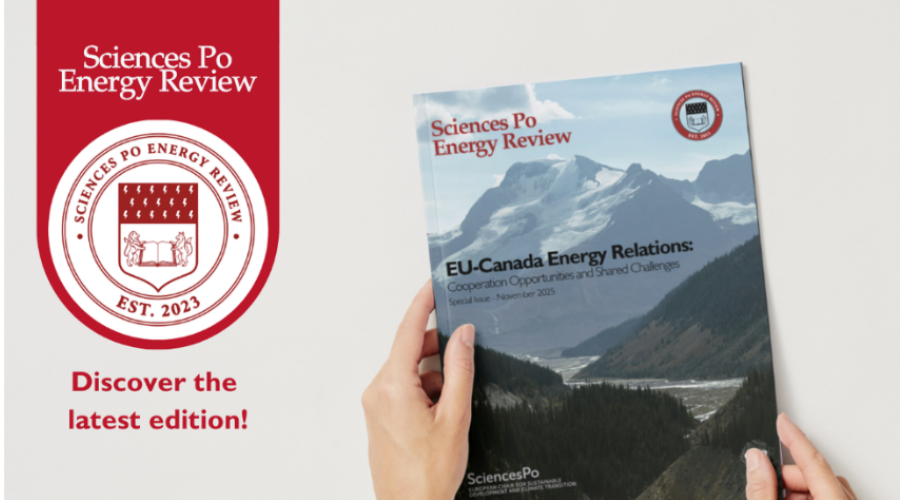
European Investment Bank Climate Hackathon 2025
9 November 2025Read and download the third issue of the Energy Review here
The Sciences Po Energy Review is a graduate student-led publication to advance dialogue about energy. Motivated by the pressing global need for energy transitions, the journal primarily employs a social scientific approach without being constrained by any single discipline, featuring graduate student writing and expert analyses. By placing contributors in conversation with peers and experts, the publication seeks to strengthen existing debates and research about energy at Sciences Po and beyond and welcomes submissions from all around the world. The Sciences Po Energy Review is hosted by the European Chair for Sustainable Development and Climate Transition.
Issue 3 – A Special Issue on EU-Canada Energy Relations
This issue, a collaboration between the CARE Programme and the Sciences Po Energy Review, explores the evolving dynamics of energy cooperation between Canada and the European Union, framed by shared political values and shifting geopolitical priorities. It highlights different tenets of the structural asymmetries between Canada’s energy abundance and the EU’s energy scarcity. It considers the technical and political feasibility of cross-Atlantic energy infrastructure and the related theme of strategic relocation of energy-intensive manufacturing to Canada to support decarbonisation and security goals.
In the present context, a shared concern pertains to the strengthening the supply chains for clean energy technologies. Particular focus is placed on the extraction and refinement of critical minerals that makes these technologies run. In this issue, detailed analyses of both Canada’s rare earth sector readiness and the impact of diverging regulatory framework between the actors gives complementary perspectives to the reader on deepened minerals collaboration. The issue also identifies opportunities for comparative policy learning, especially in relation to procedural justice for indigenous communities in energy and mining projects. Finally, the challenge of fossil fuel employment is discussed. Together, the contributions to this issue, aim to deepen understanding of the strategic, economic, and institutional dimensions of EU–Canada energy cooperation.
Editorial Team
The current editorial team comprises students enrolled in master’s programmes at the Paris School of International Affairs (PSIA) at Sciences Po.
Editorial Board: Clara Klint (editor in chief), Natalia Feinberg, Isha Hiremath, Madeleine Tron
Founding Editors: Gabriele Romeo, Ernest Lee
Scientific Advisors
The academic rigour and intellectual integrity of the Sciences Po Energy Review is enhanced and guaranteed through the appointment of the following scientific advisors:
Marc Ringel: Chairholder at the European Chair for Sustainable Development and Climate Transition at Sciences Po
Céline Cantat: CARE Program Manager


